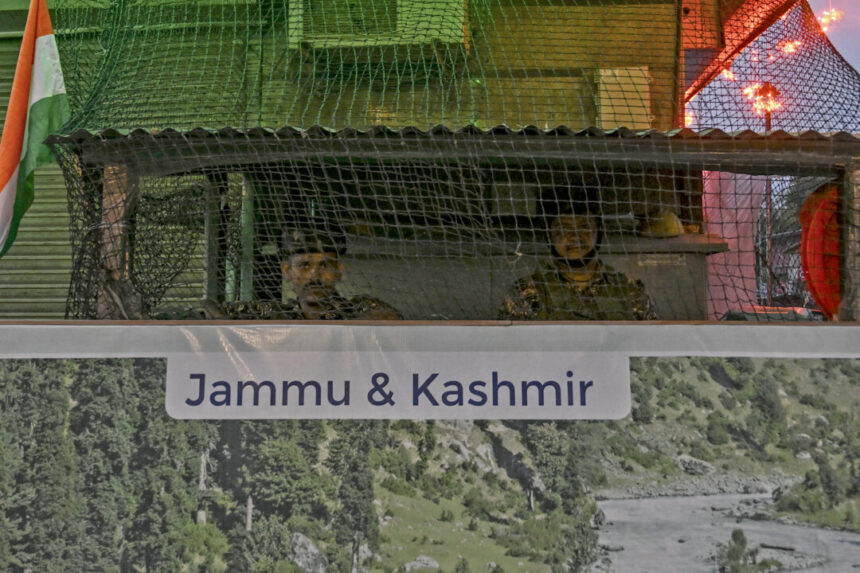Experts say a new model of narcotics-sustained terrorism is emerging in Jammu and Kashmir. After Indian Prime Minister Narendra Modi’s reelection in June, his coalition government faced a surge in terrorism incidents in previously quiet areas of Jammu in the western Himalayas. While the increase in attacks is recent, the region was already dealing with other security concerns, including rising narcotics and cross-border narcoterrorism.
According to experts, the rise of narcoterrorism in Jammu is a reflection of the geopolitical tensions between India and Pakistan. The dismantling of the old terrorism ecosystem in Jammu and Kashmir since 2019 has paved the way for a new model of terrorism sustained by narcotics. Terrorists are now utilizing narcotics dealers as on-the-ground workers for logistical and financial support.
Former deputy national security adviser of India, S.D. Pradhan, highlights the significant impact of narcoterrorism on political objectives and regional stability. The intersection of terrorism and drug trafficking can lead to destabilization, corruption, and challenges to state sovereignty. The recent increase in terrorist-related incidents in Jammu has been accompanied by a rise in narcotics-related incidents since 2019.
The complex situation in Jammu involves a network of addicted workers and drug dealers supporting terrorism through drug trafficking. Pradhan emphasizes that narcoterrorism has broad geopolitical implications and can undermine efforts to combat crimes, arms smuggling, and insurgency. The evolving threat of narcoterrorism in Jammu underscores the need for a comprehensive approach to address the complex geopolitical dynamics at play. The United Nations has listed the LeT as associated with Al-Qaida and sanctioned under the Al-Qaida sanction list. According to an analysis by Michelle Macander for the Center for Strategic and International Studies, the LeT maintains a complex relationship with Pakistan, its host country. Despite Pakistan officially banning the group and its parent organizations, there is evidence that the state has used the group as a proxy against India since the mid-1990s.
The Times of India reported that the People’s Anti-Fascist Front, an offshoot of the Pakistan-based Jaish-e-Mohammed (JeM), claimed responsibility for an attack in the Ganderbal district aimed at disrupting Indian military deployments. This group stated that the attack was against Indian military interests and those of their Chinese allies.
China previously blocked Masood Azhar, the founder and leader of JeM, from being declared a terrorist by the United Nations for a decade. However, in 2019, under pressure from the United States, China changed its stance. These developments highlight the concerning trend of the increasing nexus between terrorists and geopolitical adversaries, turning narcotics-funded terrorism into a form of geopolitical warfare.
The region has seen an upsurge in narcoterrorism, with drug syndicates forming alliances with terrorists. The militarization of the India-Pakistan border and the use of technology have made narcoterrorism more sophisticated. Former director general of the Jammu and Kashmir Police, Shesh Paul Vaid, explained that cross-border narcotics have been a longstanding issue, with smugglers operating on both sides of the border.
Border fencing erected by India in the early 2000s has reduced cross-border infiltration, but incidents persist. Recent discoveries of cross-border tunnels used by infiltrators and drug smugglers demonstrate the evolving tactics of these groups. Drones are now being utilized by Pakistan to smuggle drugs and arms across the border.
In areas like Samba and Kathua, traditional routes for infiltrators and smugglers along dry river beds are being reactivated. The use of these routes poses challenges for security forces, especially after the monsoon season when floods recede, creating gaps in wired fencing. The narcotics mafia has also exploited the Gurjar nomadic tribe for drug peddling along the border. During the summer, the Gurjar tribe migrates to higher altitude pastures with their pashmina goats or cattle, and in winter they return to their homes in the plains of Kathua, Samba, or Jammu. Shaukat Javed, a trustee at the Jammu-based Gujarat Charitable Trust, revealed to The Epoch Times that in recent years, members of the largely illiterate tribe have been increasingly exploited by the drug mafia due to their naivety and the ease with which drugs can be concealed in their traditional clothing.
According to Javed, Gurjar girls who sell milk are often lured into drug trafficking by the promise of easy money, leading to a cycle of exploitation. The drug supply chain that passes through Jammu originates from the Golden Crescent, a major source of narcotics in South Asia located in Afghanistan, Pakistan, and eastern Iran. This route allows drugs to enter the international market through Punjab and Delhi.
Experts suggest that deep state actors in the Pakistani government are involved in facilitating the drug trade, with reports alleging the use of drones to smuggle drugs across the border into India. Law enforcement sources in Jammu have reported cases of narcoterrorism, including seizures of heroin and cash linked to terrorist organizations like Hizbul Mujahideen.
The illicit drug trade, particularly involving heroin, serves as a major source of funding for terrorism in the region. The drugs travel from Afghanistan through Pakistan to India, with significant revenue generated along the way. The widespread consumption of heroin in India underscores the scale of the issue, with the Golden Crescent countries also being major consumers of opium, the raw material for heroin production. Illustration by The Epoch Times
Illegal Cultivation of Poppy Straw
During a journey through the Kathua region, The Epoch Times discovered the illegal smuggling of poppy straw from Kashmir to Punjab through the Jammu territory. Poppy straw, the leftover husk after poppy seed extraction, is classified as a drug under India’s Narcotic Drugs and Psychotropic Substances Act of 1985.
Vaid noted that the cultivation of poppy straw is not a recent occurrence and has been prevalent in the Kashmir Valley for many years, particularly in South Kashmir.
“There have been regular police crackdowns on these activities. Even two decades ago, we formed numerous teams to conduct raids based on received information. However, at times, due to lack of information, cultivators were able to grow poppy straw and make quick profits,” Vaid explained.
“As a result, sustaining such consumption levels would necessitate the illicit cultivation of approximately 1,500–2,000 hectares of opium poppy within Indian territory,” the report stated.
Vaid mentioned that despite efforts by the authorities to curb illegal cultivation, the practice persists due to its presence in remote mountainous regions where detection is challenging.
“It remains an ongoing issue, and I can’t say it has been eradicated. While some instances are detected, a significant portion goes unnoticed,” Vaid remarked.
Giasul Haq, senior district magistrate of Bani, disclosed to The Epoch Times on Sept. 6 that poppy straw is grown in the higher altitudes of Kathua due to favorable climatic conditions.
“Illegal cultivators are hard to apprehend due to the inaccessibility of remote mountainous villages. The bulk of the market is in Punjab, with the Bani region in Jammu serving as a transit route,” Haq stated.
Need for Reforms
Despite the geopolitical challenges posed by cross-border narcoterrorism, experts emphasized to The Epoch Times that internal obstacles arise from a lack of reforms and inadequate law enforcement infrastructure required to combat the issue.
“While standard operating procedures are in place, field staff encounter numerous challenges such as a lack of forensic lab facilities, leading to delayed results. Ideally, each district headquarters should have access to such facilities,” Vaid suggested.
The former police official highlighted the importance of immediate forensic results for narcotics seized from smugglers in Jammu and Kashmir. However, the lengthy wait for reports poses a hindrance.
“Sometimes evidence sits in the storage room, and culprits replace it by bribing personnel. Furthermore, legal support is lacking during case proceedings,” Vaid elaborated, noting the presence of only two forensic labs in the region, one in Jammu and the other in Kashmir.
He added that if drugs are tampered with, investigations are compromised.
“Interest wanes, officers get transferred, and complications arise,” Vaid expressed.
Vinay Khosla, the additional deputy commissioner of Billawar overseeing the sensitive regions of Ramkot and Lohai Malhar, where a recent attack occurred, informed The Epoch Times that the Kathua district administration has mandated pharmaceutical shops to install surveillance cameras to prevent the illicit sale of syringes and drugs. Compliance with proper billing and prescriptions has also been enforced.
“In its commitment to a drug-free society, the administration is identifying ‘drug-free zones.’ Revenue officers are instructed to promptly destroy any poppy cultivation,” Khosla shared.
Vaid underscored the pivotal role of the police force in combating narcoterrorism, emphasizing the need for enhanced training. He advocated for specialized investigation training, particularly for drug-related cases, to expedite investigations.
He also proposed the utilization of “summary trial” for narcotics cases, similar to how terrorism-related cases are handled. Summary trials are swift legal proceedings used to settle minor cases or disputes without a jury.
“Drug-related issues are as grave as terrorism, if not more. Through drugs, the Pakistan deep state is ruining the future of young individuals and exploiting them for terrorism. Addicted individuals become pawns in the hands of their manipulators,” Vaid warned.
Pradhan urged for international collaboration and joint operations to combat narcoterrorism.
“Moreover, nations supporting such activities should face consequences. While challenging, efforts to align on this issue can deter such support. Enhancing the effectiveness of FATF [Financial Action Task Force] is crucial,” Pradhan recommended.
FATF serves as a global watchdog for money laundering and terrorist financing. Pradhan proposed empowering FATF to independently investigate financial trails rather than relying on reports from accused states.
Please rewrite this sentence.
Source link





